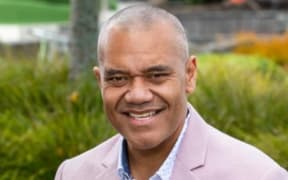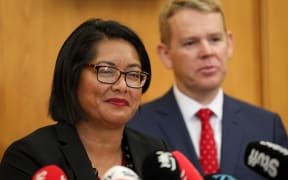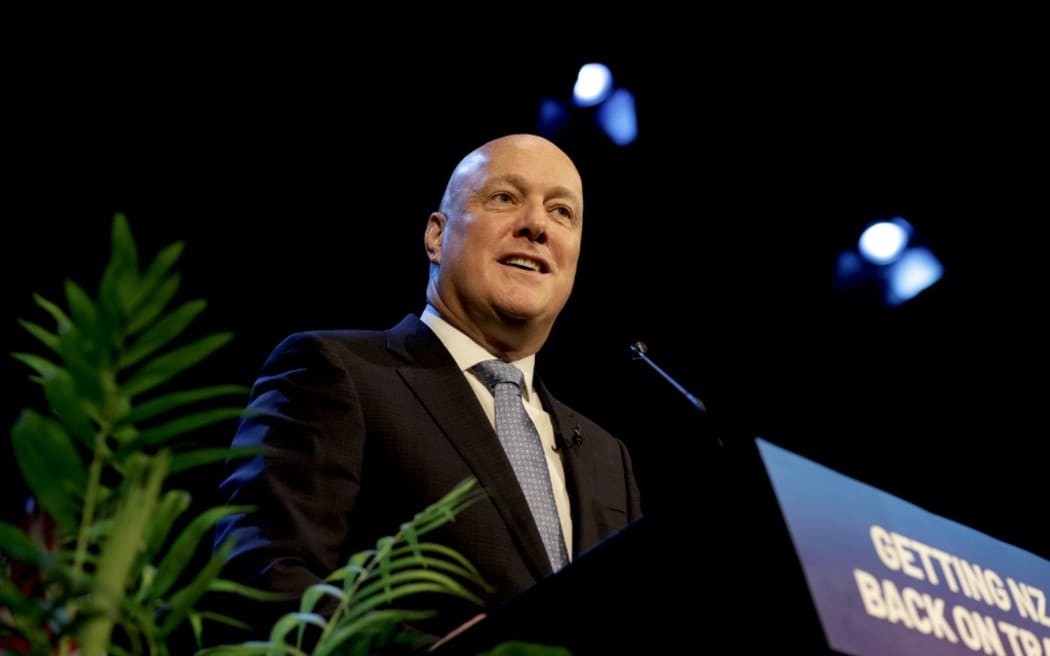
Christopher Luxon showcased his own party's agenda in the State of the Nation speech, according to commentators. Photo: RNZ/Marika Khabazi
Analysis - Christopher Luxon comes out from under the shadow of his coalition partners with his State of the Nation speech, he sets his own agenda and it's quickly followed by action. Grant Robertson's decision to retire from politics leaves a huge gap on Labour's front bench and the sudden death of Efeso Collins brings Parliament to a standstill.
Luxon delivered his State of the Nation speech last Sunday and, for the first time since the election, the prime minister was where he should be - centre stage and out from under the shadows of David Seymour and Winston Peters.
Luxon pledged he would be an upfront, straight-talking prime minister ready to make the hard calls needed to repair New Zealand's "fragile" economy.
He put beneficiaries who don't meet their jobseeker obligations on notice that the "free ride" would come to an end and said those who had been on a benefit for many years would be targeted.
"Sunday's speech was good," said Stuff's Andrea Vance.
"Better still was the presentation: Luxon sounded like a normal person. He was speaking informally, taking the audience by the shoulder and inviting them to see what he sees."
Vance thought there were shades of John Key's style. "Relaxed, if you like, or certainly more at ease in the role."
Vance, and others, noticed there was no mention of National's coalition partners.
Luxon was doing his own thing, for his own party, setting his own agenda.
The Herald's columnist Simon Wilson said the speech was well received by the party faithful.
"They cheered, often. They seemed to love hearing that other people would have to do it tough," he said.
"But if Luxon really wanted to present us with courage and leadership in these fragile times, he'd stop telling his supporters what they want to hear."
Wilson suggested Luxon's promised "straight talking" should include asking them to share the burden.
"Yep, he'd cancel the promise of tax cuts for the wealthy," he said.
"And if he really wanted to 'give Kiwis a reason to stay in New Zealand' as he said on Sunday, he'd name the biggest cause of migration to Australia: higher wages."
Wilson said the government's 100-day plan was doing the opposite of encouraging a high-wage economy.
"The fair pay agreements law has been scrapped, 90-day trials reintroduced and the just announced minimum wage rise is less than inflation.
"All of this will hold down local wages and widen, not narrow, the wage gap between Australia and New Zealand."
Ramping up benefit check-ins and sanctions
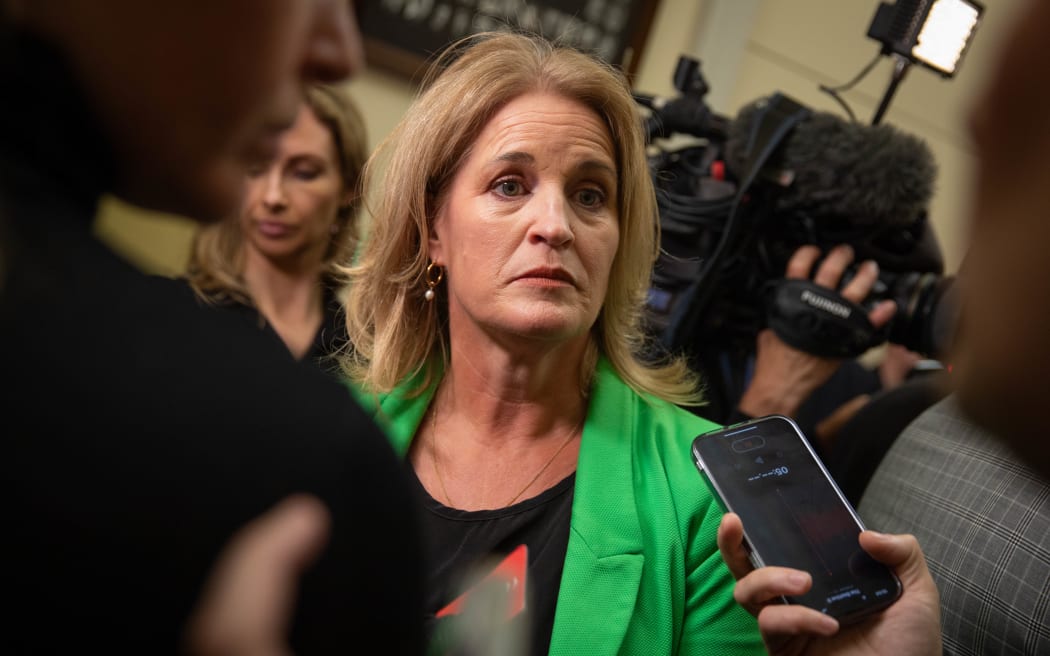
Photo: RNZ / Angus Dreaver
On Monday, Luxon brought Social Development and Employment Minister Louise Upston to his post-cabinet press conference.
He was not losing any time over the jobseeker benefit issue, and he wanted to show his government "gets things done".
They announced a ramping up of benefit sanctions would begin in June - particularly for young people, RNZ reported.
The ministry would begin "work check-ins" for jobseekers who had been on a benefit for at least six months.
It would begin the rollout of a more comprehensive system for benefit sanctions.
This would include mandatory re-application for Jobseeker Support every six months instead of each year, community-provided job coaching, needs assessments, a traffic light system, new non-financial sanctions, and action being taken for those who repeatedly failed to
comply with their work obligations.
Those measures have not just been thought up. National announced the traffic light system in September last year during the election campaign.
At the press conference, which was packed with references to the government's utter determination to get young people into jobs and not watch them become trapped in welfare dependency, Luxon and Upston gave figures to back their case.
Upston said remaining on a benefit had become the "rational choice" for too many people, with 70,000 more people on Jobseeker Support since 2017 and 40,000 more receiving the support for at least a year.
The weekly post-cabinet press conference is the big, kick-off event of the week and using it to announce the measures was deliberate.
"Choosing to make it the centrepiece of the post-cabinet press conference was more about pure political theatre rather than the substance of the move," said the Herald's political editor Claire Trevett.
"It was not news of anything new but rather a stop-gap measure before National brings in its own newly-packaged sanctions regime toward the end of the year."
Trevett said that did not mean it was not good politics.
"Talking tough about the jobless is almost always good politics for a National Party leader and Luxon does it well, talking about 'tough love' and telling the young unemployed that their 'free ride' is over," she said.
"He can do it safe in the assumption a fair chunk of voters will feel he is more than justified."
Trevett got that right, it will sit well with a lot of people and will not do National any harm at all. Opposition parties did not like it.
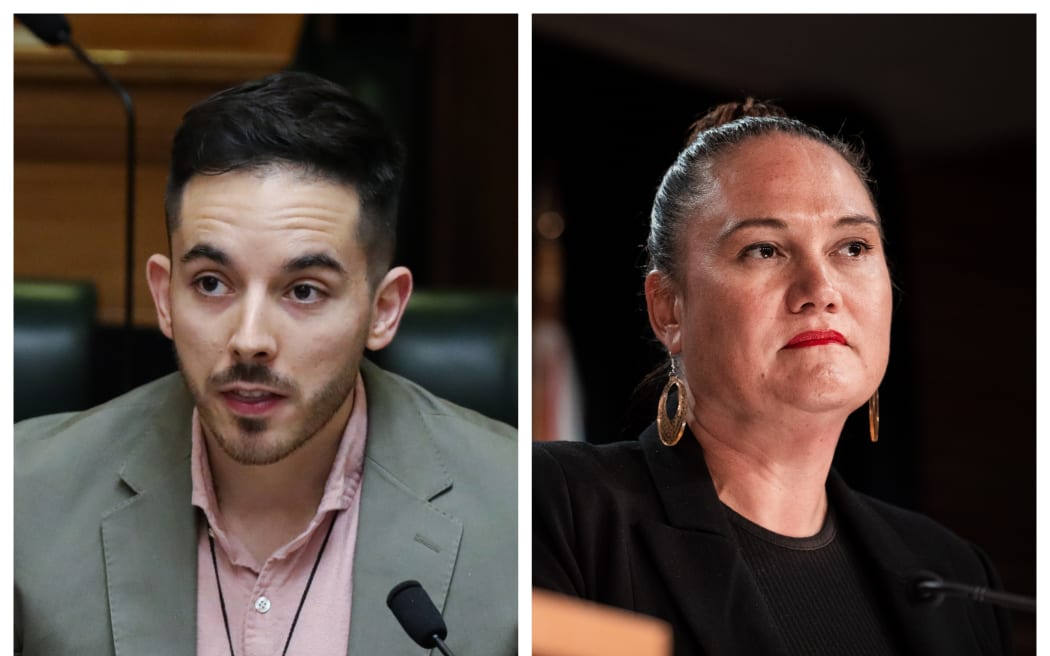
Opposition parties are not happy with the government's announcement on benefits. (Pictured Ricardo Menendez March and Carmel Sepuloni) Photo: VNP / RNZ
Labour social development spokesperson Carmel Sepuloni said the government was unfairly assuming jobseekers did not want to start on employment education or training pathways.
"Rather than being stingy on the minimum wage and bashing beneficiaries, the coalition government should be focused on lifting incomes for the poorest New Zealanders," she said.
The Greens' social development and employment spokesperson, Ricardo Menendez March, said the government was creating another measure to penalise the poorest.
"Sanctions do not work… this government is quickly building a legacy of cruelty," he said.
"Instead of supporting people to provide for themselves and their whānau, this government has actively sought to push people further and further into poverty."
Welfare advocates pleaded with the government to back down, RNZ reported.
Luxon's speech and the announcement a day later began a good week for National.
Poll brings more good news for National
Another piece of good news was a 1News-Verian poll which showed National one point up since the last poll, taken before the election.
It stood on 38 percent with Labour steady at 28 percent.
Of more importance was Labour leader Chris Hipkins falling 10 points to 15 percent as preferred prime minister, with Luxon steady on 25 percent and solidly ahead of the pack.
ACT dropped a point to 8 percent, a contrast to the Taxpayers' Union-Curia poll taken in early February which showed ACT climbing 5.6 points to 13.7 percent.
Robertson leaves big shoes to fill
Grant Robertson has been a towering figure in the Labour Party for so long that his decision to leave was a seismic event.
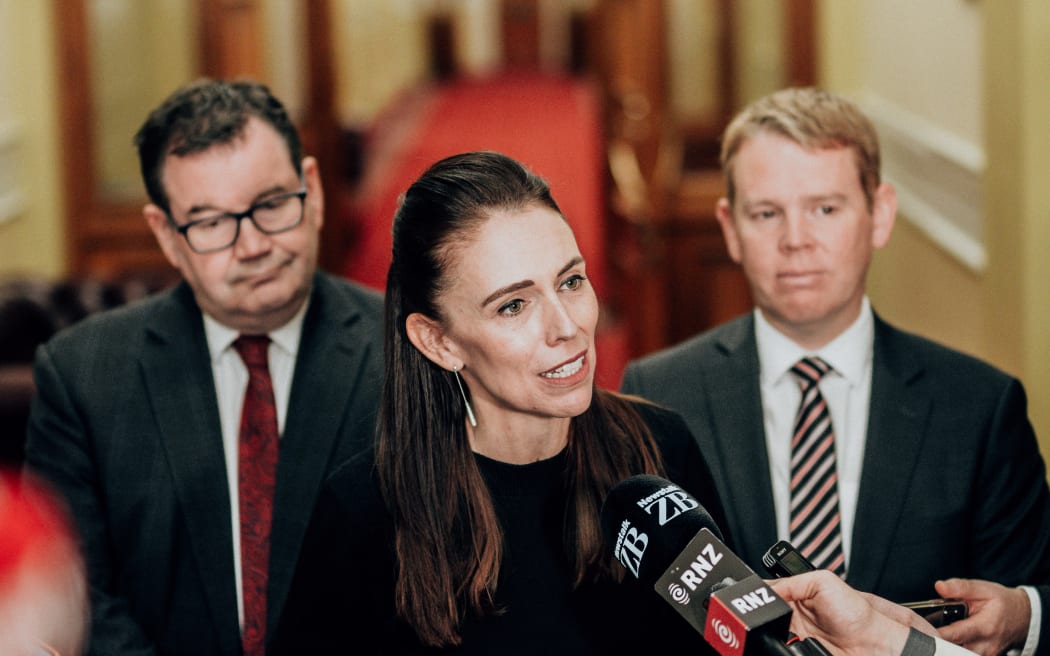
Just Chris Hipkins is left in the party from the trio with Ardern-Robertson. Photo: RNZ / Dom Thomas
Jacinda Ardern's closest confidante and Chris Hipkins' best friend, the former finance minister is taking over as Vice Chancellor of Otago University, back in his home town of Dunedin.
Speaking about his career, Robertson said the chance to make a positive difference in the lives of New Zealanders was not afforded to many people.
"I have given absolutely everything to these roles, but now is the right time to for me to move on to a new set of opportunities," he said.
Tributes poured in and RNZ's political editor Jo Moir said Robertson had made a political career out of being the consummate support partner.
"With a decimated caucus and the new realities of being in opposition, Labour could be forgiven for wondering what they will do without their former finance minister," she said.
"Robertson claims 'politics is much bigger than any one person and nobody is indispensable' but if any Labour MP were asked to name the one colleague they would struggle to do without, it's Robertson that would spring to mind."
Numerous parliamentarians paid tribute to his service, among them Luxon and Finance Minister Nicola Willis.
Neither spoke disparagingly of him but Seymour and Peters seemed unable to resist seizing the opportunity.
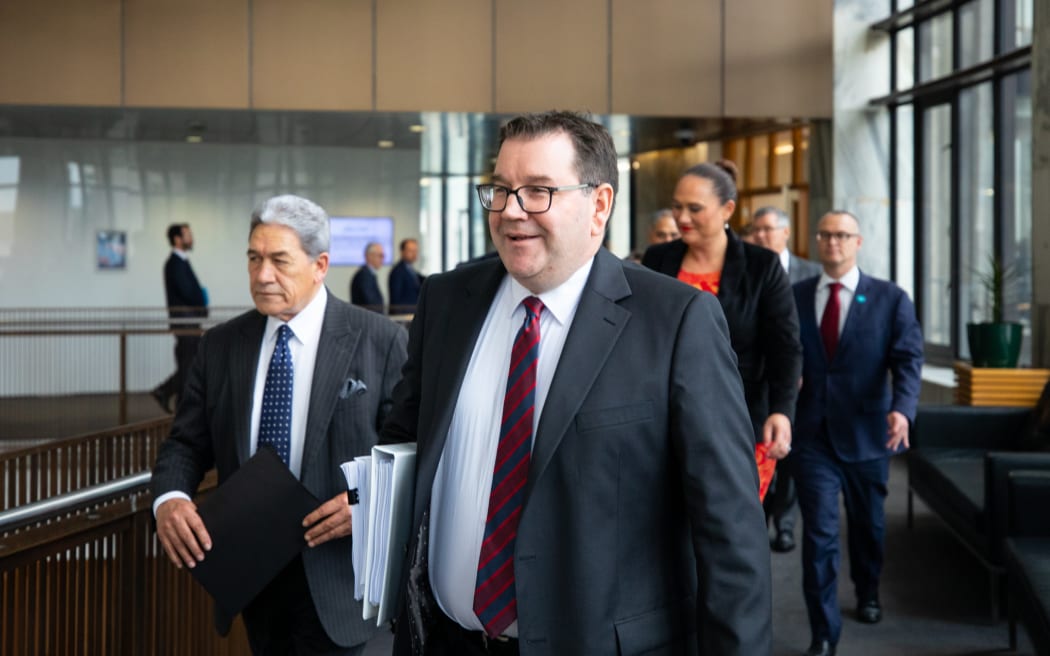
Winston Peters did not mince his words when it came to talking about Grant Robertson's departure. Photo: RNZ / DOM THOMAS
Seymour pretended he might regret Robertson's departure. "Were he to be replaced by a more competent person, that would make it harder for the ACT Party," he said.
Peters said Robertson's move to Otago University was a good fit. "He's going off to a university that's $100 million in debt, having left this country in debt as well, so he's well practiced as to what he should be able to do now," he said. "But I wish him all the best."
The Herald's Trevett explained the significance of Robertson's departure.
"He knew what he was doing and he'd become a pretty crucial guiding hand for a lot of them, a bit of a spine of that caucus, and now they kind of have to learn to stand alone without him," she said.
"He loved the politics of it all a lot more than Jacinda Ardern did and he could be very effective at it, his roasts of his political rivals in Parliament are pretty famous, and he's very good at question time."
Hipkins replaced Robertson with Barbara Edmonds as Labour's finance spokesperson. She has a hard act to follow.
"Barb has a background as a specialist tax lawyer and is a formidable parliamentarian with experience across nine portfolios as minister and several more as an advisor in a ministerial office," Hipkins said in a statement.
"Barb is not only incredible clever with a broad knowledge base, she also has the interpersonal skills to work with people from every background across all sectors."
To find out more about her, read RNZ's article 'Who is new Labour finance spokesperson Barbara Edmonds?'
Efeso Collins' death
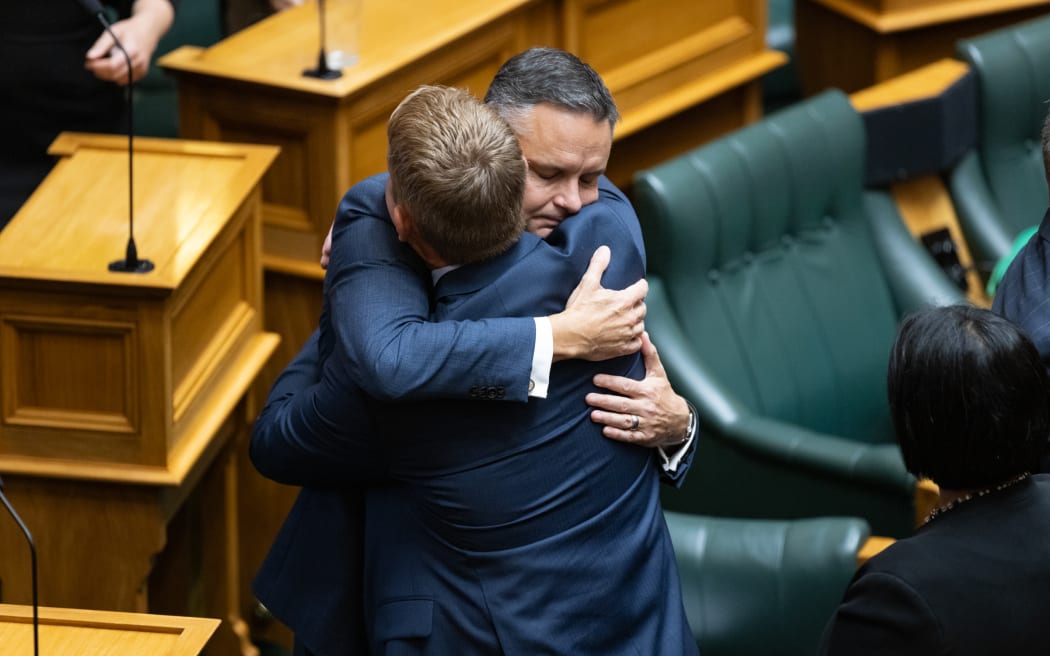
Labour leader Chris Hipkins embraces Green co-leader James Shaw in Parliament after their tributes to Efeso Collins on 21 February. Photo: VNP / Phil Smith
On Wednesday, the sudden death of Green Party MP Fa'anānā Efeso Collins shocked Parliament.
The 49-year-old collapsed and died during a charity run in Auckland.
"Parliament brought to a standstill by a tsunami of collective grief," RNZ reported.
There were tributes in the House that afternoon and media appearances by party leaders before Speaker Gerry Brownlee adjourned Parliament until next week.

Fa'anānā Efeso Collins Photo:
Fa'anānā had delivered his maiden speech just six days earlier.
The Herald described Fa'anānā as "a politician of heart and soul" while Stuff said he lived a life of service and was "a proud son of the Pacific".
His many roles were noted in numerous reports.
Green Party co-leaders James Shaw and Marama Davidson released a joint statement saying they were devastated.
"Aotearoa and the Green Party have lost one of the kindest, most dedicated champions of fairness and equality," they said.
"Efeso dedicated his life to serving and making a difference to the lives of those he met.
"A beautiful family has lost a dedicated father, husband and community leader."
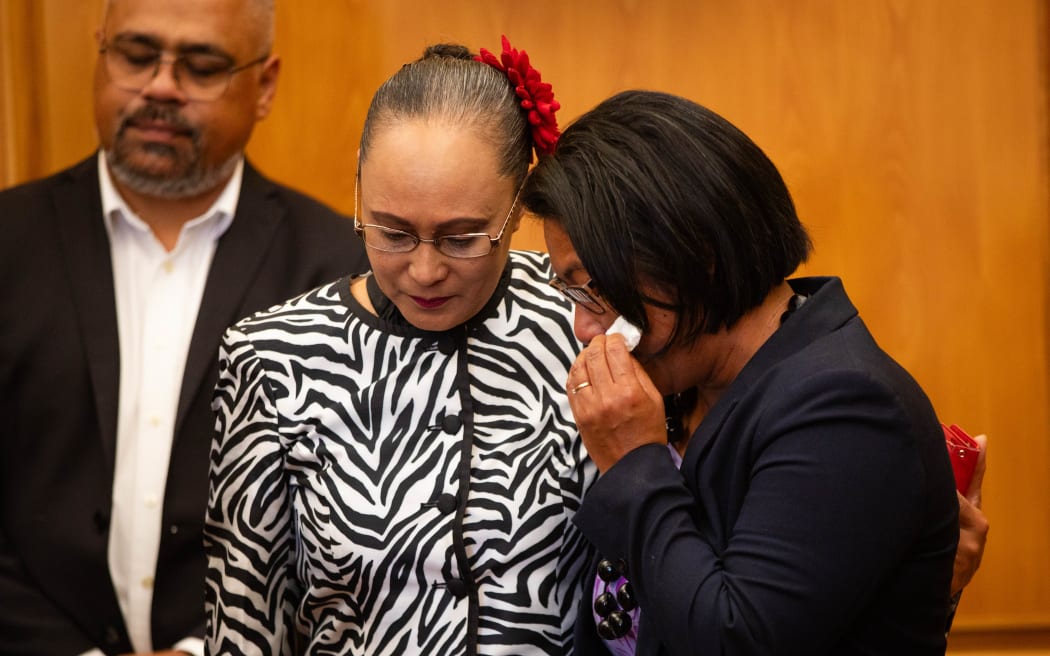
Labour party members Jenny Salesa (left) and Barbara Edmonds pay tribute to Fa'anānā Efeso Collins on 22 February. Photo: RNZ/ Angus Dreaver
Fa'anānā left behind a wife and two daughters.
As RNZ reported, his death means another caucus shift for the Greens.
The party has had more than its fair share of unsettling events recently.
First there was the shoplifting allegations against Golriz Ghahraman and her resignation from Parliament, then Shaw's resignation from the co-leadership and his decision to leave in March.
Ghahraman's departure meant former Wellington mayor Celia Wade-Brown joining the caucus.
When Shaw announced he would resign, it signalled Dr Lawrence Xu-Nan, who has a PhD in ancient history, would come in when Shaw leaves.
Fa'anānā's death has brought that forward, and Xu-Nan will replace him.
When Shaw leaves, Francisco Hernandez will join the caucus.
Hernandez is a former president of the Otago University's Students' Association with an honours degree in politics. He has worked as an advisor to the Climate Change Commission.
That is quite a mixed bag the Greens have on their benches and there are going to be some steep learning curves,
*Peter Wilson is a life member of Parliament's press gallery, 22 years as NZPA's political editor and seven as parliamentary bureau chief for NZ Newswire.

